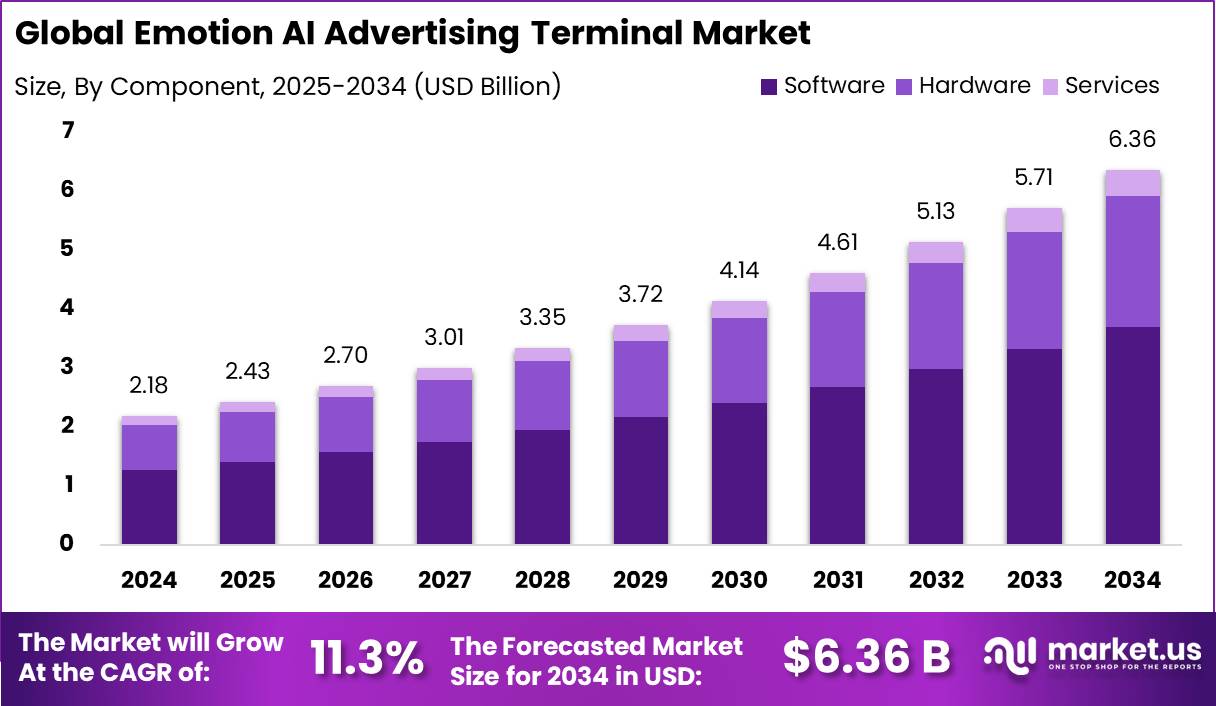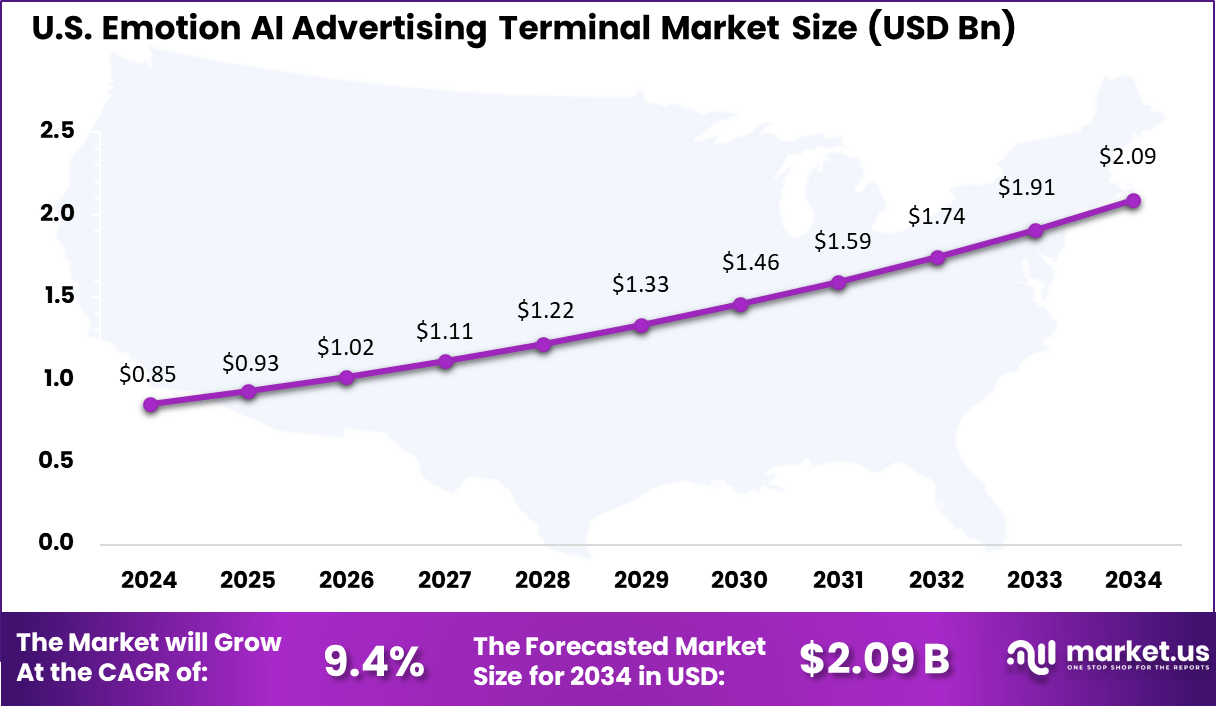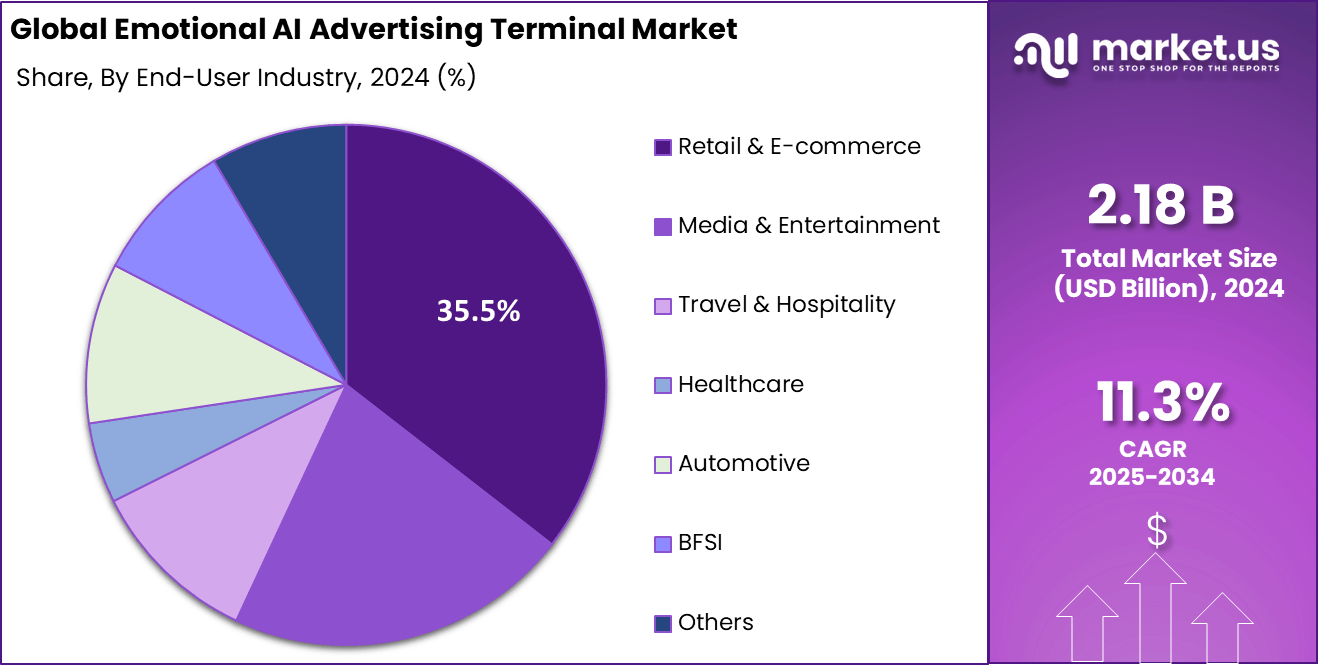Global Emotion AI Advertising Terminal Market Size, Share, Industry Analysis Report By Component (Software and Services), By Deployment Mode (Cloud-based and On-premise), By Application (Content Personalization & Optimization, Audience Analytics & Measurement, Real-time Customer Engagement, and Others), By End-User Industry, By Region and Companies - Industry Segment Outlook, Market Assessment, Competition Scenario, Trends and Forecast 2025-2034
- Published date: Sept. 2025
- Report ID: 157448
- Number of Pages: 279
- Format:
-
keyboard_arrow_up
Quick Navigation
- Report Overview
- Key Takeaways
- Analysts’ Viewpoint
- Investment and Business Benefits
- Role of Generative AI
- Emerging Trends
- U.S. Market Size
- By Component Analysis
- By Deployment Mode Analysis
- By Application Analysis
- By End-User Industry Analysis
- Key Market Segments
- Driver
- Restraint
- Opportunity
- Challenge
- Key Player Analysis
- Recent Developments
- Report Scope
Report Overview
The Global Emotion AI Advertising Terminal Market size is expected to be worth around USD 6.36 billion by 2034, from USD 2.18 billion in 2024, growing at a CAGR of 11.3% during the forecast period from 2025 to 2034. In 2024, North America held a dominant market position, capturing more than a 40.6% share, holding USD 0.89 billion in revenue.
The Emotion AI Advertising Terminal Market encompasses interactive systems equipped with artificial intelligence to detect and interpret human emotions through various modalities such as facial expressions, voice tone, and physiological signals. These systems enable advertisers to deliver personalized content that resonates emotionally with consumers, thereby enhancing engagement and conversion rates.

The primary factors driving the growth of this market include advancements in emotion recognition technologies, increased demand for personalized advertising experiences, and the proliferation of digital touchpoints such as smart displays and interactive kiosks. These technologies allow for real-time analysis of consumer emotions, enabling advertisers to tailor content dynamically to individual preferences and emotional states.
According to Market.us, The global Emotion AI market is poised for significant growth, with the market size expected to reach USD 17.8 billion by 2034, up from USD 2.48 billion in 2024, reflecting a compound annual growth rate (CAGR) of 21.80% from 2025 to 2034. The increasing adoption of emotion recognition technologies in sectors such as healthcare, automotive, and customer service is driving this expansion.
The demand for emotion AI advertising terminals is particularly strong in sectors such as retail, automotive, healthcare, entertainment, and banking, financial services, and insurance (BFSI). These industries leverage emotion AI to enhance customer experiences, improve service delivery, and optimize marketing strategies. The ability to gauge consumer emotions provides valuable insights that inform content creation and campaign management
Key Takeaways
- The global emotion AI advertising terminal market is valued at USD 2.18 billion in 2024 and is projected to grow at a CAGR of 11.3% from 2025 to 2034.
- Software dominates with a 65.8% share in 2024, led by demand for facial expression, voice, and gesture analysis solutions.
- Cloud-based deployment accounts for 70.4% of the market, reflecting a strong shift toward scalable and easily integrated platforms.
- Audience Analytics & Measurement leads applications with 50.1% share, as brands seek precise consumer behavior insights.
- Retail & E-commerce is the top end-user industry with 35.5% share, driven by personalized shopping experiences and targeted advertising.
- North America holds a 40.6% share of the market, with the U.S. alone at USD 0.85 billion, growing at a CAGR of 9.4%.
Analysts’ Viewpoint
The demand for Emotion AI advertising terminals is fueled by sectors like retail, e-commerce, automotive, and media, where customer emotions significantly influence purchasing decisions and brand loyalty. These terminals help brands monitor and interpret emotional engagement across various touchpoints, such as online ads, in-store displays, and customer service interactions.
The ability to gauge emotional reactions in real-time supports dynamic campaign adjustments and improves overall customer experience, making the technology increasingly valuable for marketers aiming to stand out in crowded markets. Technological adoption leading this market includes AI-powered facial recognition, voice analysis, sentiment analysis from text, and biosensors.
AI algorithms analyze this input to generate actionable insights, allowing advertisers to optimize content and user interaction based on emotional cues. The driving reasons for adopting these technologies include improving customer satisfaction through emotional intelligence, increasing campaign effectiveness, reducing marketing costs, and gaining competitive advantages in highly dynamic consumer environments.
Investment and Business Benefits
Investment opportunities in the Emotion AI advertising terminal market arise from the expanding interest in AI-driven marketing solutions. Companies can invest in hardware development, software platforms, AI algorithm improvement, and integration services. There is also potential in developing specialized applications for sectors such as automotive safety, retail personalization, and entertainment.
From a business perspective, the benefits of Emotion AI advertising terminals include enhanced customer insights, improved targeting accuracy, personalized content delivery, and stronger emotional connections with audiences. These benefits translate into increased conversion rates, higher customer retention, and ultimately better return on marketing investments.
The regulatory environment around Emotion AI is evolving to address privacy, ethical concerns, and data protection. Particularly in regions like the European Union and the United States, strict regulations govern the collection and use of biometric and emotional data to prevent misuse and protect consumer rights. Laws such as the EU AI Act categorize emotion recognition as high-risk AI systems, imposing transparency, fairness, and accountability requirements.
Role of Generative AI
Key Points Description Hyper-Personalized Content Creation Generative AI enables creation of highly personalized ads based on real-time emotional data. Real-Time Emotional Feedback Integration AI adjusts ads dynamically by analyzing consumers’ facial expressions and voice tones instantly. Enhanced Consumer Engagement Generative AI helps craft emotionally resonant messages that deepen audience connection. Predictive Emotional Analytics AI forecasts emotional reactions to campaigns to optimize future ad targeting and content. Automation of Creative Processes Speeds up creation by generating content variations that align with audience moods. Emerging Trends
Key Trends Description Increased Use of Multimodal Emotion Recognition Combining facial, voice, and body language cues for richer emotional insights. Integration with Gen Z Hyper-Personalized Advertising Targeting young consumers with Gen AI-driven, emotionally tailored ads. Real-Time Ad Content Optimization Dynamic adjustments of ads based on live emotional responses to boost effectiveness. Privacy and Ethical Considerations Focus on transparency and ethical use of emotional data in advertising. Cross-Industry Expansion Adoption spreading beyond retail to automotive, healthcare, entertainment, and BFSI sectors. U.S. Market Size
The U.S. Emotion AI Advertising Terminal Market, valued at USD 0.85 billion in 2024 and projected to grow at a CAGR of 9.4%, is driven by strong adoption of AI-powered personalization across retail, media, automotive, and healthcare sectors. U.S. retailers like Walmart and Walgreens are piloting emotion-recognition kiosks and AI-driven digital signage to measure customer sentiment and adjust in-store promotions in real time.
Media companies leverage platforms like Realeyes to test ad creatives using facial and attention analytics before campaigns go live, improving ROI. In automotive showrooms, emotion-aware displays personalize offers and highlight relevant vehicle features based on consumer reactions.
The U.S. market also benefits from the presence of major AI innovators such as Affectiva (Smart Eye) and Microsoft Azure Cognitive Services, which provide scalable emotion analytics solutions. However, stringent privacy regulations, including CCPA, require vendors to invest in secure, anonymized data handling, balancing innovation with compliance to maintain consumer trust.

In 2024, North America held a dominant market position, capturing more than 40.6% share and generating USD 0.89 billion in revenue in the emotion AI advertising terminal market. The region’s leadership can be attributed to the rapid integration of advanced artificial intelligence technologies in digital advertising.
Companies in the United States and Canada are at the forefront of utilizing emotion recognition systems in advertising terminals, which allow brands to tailor their messaging in real-time based on consumer emotional reactions. This technological edge enhances engagement, improves targeting, and maximizes advertising impact.
North America’s dominance is further strengthened by a robust advertising ecosystem, including the widespread use of digital signage and interactive kiosks across retail, entertainment, and public spaces. The region’s high consumer spending, coupled with an established infrastructure for data collection and analysis, enables brands to leverage emotion AI to deliver personalized experiences.

By Component Analysis
The Emotion AI Advertising Terminal market in 2024 shows strong dominance across key segments, with the software component accounting for 65.8% of the market. This highlights the critical role of AI software platforms that interpret emotional data and deliver actionable insights to advertisers.
Software advancements enable complex emotional recognition and real-time analytics, empowering companies to tailor marketing campaigns and customer interactions with high precision. The software’s ability to process vast multimodal data – including facial expressions, voice tones, and physiological signals – enables accurate emotion detection and personalized audience engagement.
Continuous upgrades in AI algorithms and machine learning models drive performance, making software the foundation of emotion AI advertising solutions. This maturity in software enhances ad effectiveness by enabling emotionally resonant messaging that improves consumer response and satisfaction.
By Deployment Mode Analysis
In deployment, the cloud-based segment leads with 70.4% market share in 2024, reflecting a strong shift towards scalable, flexible, and cost-efficient cloud solutions for emotion AI advertising terminals. Cloud infrastructure supports large-scale data processing and storage required to handle emotionally rich multimedia inputs, facilitating seamless integration with other digital marketing technologies and platforms.
Cloud deployment offers benefits like reduced upfront investment, easy upgrades, remote access, robust security, and faster time to market, which attract businesses seeking agility in deploying emotion AI capabilities across multiple channels. The cloud model also enables real-time data analytics, crucial for fine-tuning advertising strategies and delivering personalized consumer experiences at scale.
By Application Analysis
For applications, audience analytics and measurement account for 50.1% of usage in 2024 within the Emotion AI Advertising Terminal market. This application harnesses emotion AI’s power to decode consumer emotional responses toward ads and content, enhancing targeting accuracy and campaign attribution.
Analyzing emotional engagement helps marketers better understand their audience’s preferences, optimize messaging, and improve ROI by identifying emotionally impactful creative elements. Audience analytics combine emotional data with traditional metrics to offer a nuanced understanding of consumer behaviors and brand perceptions.
By measuring real-time emotional reactions, companies can instantaneously adjust campaigns to maintain consumer interest and satisfaction, creating more effective, emotion-driven advertising strategies that foster brand loyalty and higher conversion rates.
By End-User Industry Analysis
In terms of end-user industries, retail and e-commerce lead with a 35.5% market share in 2024, leveraging emotion AI advertising terminals to enhance personalized shopping experiences and customer interactions. Retailers use emotion AI to analyze shopper emotions in real time, tailoring promotions and recommendations to individual feelings and moods, which can boost engagement and sales.
The adoption in retail and e-commerce reflects the sector’s focus on customer-centric marketing and the growing importance of delivering seamless omnichannel experiences. Emotion AI helps retailers optimize in-store and online campaigns by aligning offers with emotional triggers, reducing cart abandonment, and enriching customer satisfaction. This competitive advantage drives increased investment in emotion AI technologies within retail and e-commerce environments.

Key Market Segments
Component
- Software
- Facial Expression Analysis
- Voice & Speech Analysis
- Gesture & Gait Analysis
- Others
- Hardware
- Cameras
- Sensors
- Integrated SoC Displays
- Others
- Services
- Integration & Deployment
- Support & Maintenance
- Consulting
Deployment Mode
- Cloud-based
- On-premise
Application
- Content Personalization & Optimization
- Audience Analytics & Measurement
- Real-time Customer Engagement
- Others
End-User Industry
- Retail & E-commerce
- Media & Entertainment
- Travel & Hospitality
- Healthcare
- Automotive
- BFSI
- Others
Key Regions and Countries
- North America
- The US
- Canada
- Europe
- Germany
- France
- The UK
- Spain
- Italy
- Russia
- Netherland
- Rest of Europe
- APAC
- China
- Japan
- South Korea
- India
- Australia & New Zealand
- ASEAN
- Rest of APAC
- Latin America
- Brazil
- Mexico
- Rest of Latin America
- Middle East & Africa
- GCC Countries
- South Africa
- Rest of MEA
Driver
Growing Demand for Real-Time Emotional Insights in Advertising
The rising demand for real-time emotional insights is a key driver supporting the growth of the Emotion AI Advertising Terminal market. Brands increasingly recognize the value of understanding consumers’ immediate emotional responses to advertisements. This helps marketers craft more relevant and engaging campaigns, improving overall advertising effectiveness.
The ability to analyze facial expressions, voice intonations, and body language in real time delivers deeper consumer insight than traditional methods based on surveys or demographic data. This real-time emotional data allows advertisers to adapt their messaging and approaches during campaigns instead of relying on post-campaign analysis.
Companies use Emotion AI terminals to assess viewer reactions instantly, enabling them to optimize content and placement for stronger emotional connection and higher engagement rates. As businesses focus more on customer experience personalization, this driver fuels expanded adoption of emotion recognition technologies in advertising applications.
Restraint
Privacy Concerns and Data Security Issues
Privacy concerns remain a significant restraint on wider Emotion AI Advertising Terminal adoption. The technology depends on collecting highly personal data, including facial expressions, voice, and potentially biometric cues, raising fears over misuse or unauthorized data sharing. Consumers may feel uncomfortable or distrustful knowing their emotions are constantly monitored through cameras and sensors in advertising environments.
In addition, regulatory frameworks governing data privacy are tightening globally, requiring companies to comply with strict rules on consent, data storage, and usage transparency. These legal challenges can delay technology deployment or increase compliance costs. Privacy concerns may also slow consumer acceptance and limit the scale of Emotion AI terminal implementation in public or sensitive settings.
Opportunity
Personalized Customer Engagement and Targeting
An important opportunity enabled by Emotion AI Advertising Terminals lies in creating highly personalized customer engagement. By analyzing emotional signals, marketers can tailor advertising content and offers to resonate deeply with individual viewers’ moods and preferences. This level of customization promises to drive improved brand loyalty and higher conversion rates.
Emotion AI tools can detect emotional shifts such as frustration, happiness, or boredom during customer interactions and adjust advertising dynamically to maintain positive sentiment. For example, an e-commerce platform can modify promotions in real time based on shopper emotional states detected by these terminals.
Challenge
Cultural Variability and Emotion Recognition Accuracy
One major challenge facing Emotion AI Advertising Terminals is the complexity of accurately recognizing emotions across diverse cultural contexts. Emotional expressions can vary widely by culture, and AI systems trained on limited or biased datasets may misinterpret signals from different demographic groups. This undermines the technology’s reliability and effectiveness.
Moreover, subtle emotions and mixed feelings are difficult to detect precisely. Inaccurate emotion recognition risks delivering irrelevant or inappropriate ads, potentially damaging brand reputation. Developers must continuously improve algorithms and expand diverse training data to overcome these challenges and ensure that Emotion AI terminals deliver consistent and culturally sensitive insights.
Key Player Analysis
Smart Eye (Affectiva) is a prominent player in the Emotion AI Advertising Terminal Market. The company’s innovative solutions focus on emotional intelligence using facial expression and physiological response analysis. Realeyes also stands out, leveraging AI to analyze human emotions through facial recognition. Their technology provides deep insights into consumer behavior and advertising effectiveness.
Neurotechnology’s SentiSight.ai and Emotibot are also significant contributors to the market. Neurotechnology offers advanced emotion recognition solutions based on facial analysis, providing actionable insights for the advertising sector. Emotibot brings AI-driven emotion analysis through chatbot technologies, enhancing user interaction and engagement.
Other notable players in the market include Sightcorp, Affect Lab, IBM Watson, Microsoft Azure Emotion API, and Google Cloud Vision API. Sightcorp specializes in facial recognition software to detect emotions, while Affect Lab offers emotion AI solutions for various industries, including advertising. IBM Watson, Microsoft Azure, and Google Cloud Vision provide powerful emotion AI services through their cloud platforms, offering businesses access to advanced analytics tools.
Top Key Players
- Smart Eye (Affectiva)
- Realeyes
- Eyeris
- Neurotechnology (SentiSight.ai)
- Emotibot
- Eyeris Technologies
- Beyond Verbal
- nViso
- Sightcorp
- Affect Lab
- IBM Watson
- Microsoft Azure Emotion API
- Google Cloud Vision API
- Other Key Players
Recent Developments
- April 2025: Nihilent has launched Emoscape, a contactless emotion AI engine decoding human behavior using the nine classical emotions (Navarasa) from India’s Natyashastra. Combining 3D motion capture, AI, and machine learning, it offers applications in healthcare, marketing, education, and corporate wellness, providing culturally rooted emotional insights without sensors, while enabling external developer innovation.
Report Scope
Report Features Description Market Value (2024) USD 2.18 Bn Forecast Revenue (2034) USD 6.36 Bn CAGR(2025-2034) 11.3% Base Year for Estimation 2024 Historic Period 2020-2023 Forecast Period 2025-2034 Report Coverage Revenue forecast, AI impact on Market trends, Share Insights, Company ranking, competitive landscape, Recent Developments, Market Dynamics and Emerging Trends Segments Covered By Component (Software and Services), By Deployment Mode (Cloud-based and On-premise), By Application (Content Personalization & Optimization, Audience Analytics & Measurement, Real-time Customer Engagement, and Others), By End-User Industry (Retail & E-commerce, Media & Entertainment, Travel & Hospitality, Healthcare, Automotive, BFSI, and Others) Regional Analysis North America – US, Canada; Europe – Germany, France, The UK, Spain, Italy, Russia, Netherlands, Rest of Europe; Asia Pacific – China, Japan, South Korea, India, New Zealand, Singapore, Thailand, Vietnam, Rest of Latin America; Latin America – Brazil, Mexico, Rest of Latin America; Middle East & Africa – South Africa, Saudi Arabia, UAE, Rest of MEA Competitive Landscape Smart Eye (Affectiva), Realeyes, Eyeris, Neurotechnology (SentiSight.ai), Emotibot, Eyeris Technologies, Beyond Verbal, nViso, Sightcorp, Affect Lab, IBM Watson, Microsoft Azure Emotion API, Google Cloud Vision API, and Other Key Players Customization Scope Customization for segments, region/country-level will be provided. Moreover, additional customization can be done based on the requirements. Purchase Options We have three license to opt for: Single User License, Multi-User License (Up to 5 Users), Corporate Use License (Unlimited User and Printable PDF)  Emotion AI Advertising Terminal MarketPublished date: Sept. 2025add_shopping_cartBuy Now get_appDownload Sample
Emotion AI Advertising Terminal MarketPublished date: Sept. 2025add_shopping_cartBuy Now get_appDownload Sample -
-
- Smart Eye (Affectiva)
- Realeyes
- Eyeris
- Neurotechnology (SentiSight.ai)
- Emotibot
- Eyeris Technologies
- Beyond Verbal
- nViso
- Sightcorp
- Affect Lab
- IBM Watson
- Microsoft Azure Emotion API
- Google Cloud Vision API
- Other Key Players













